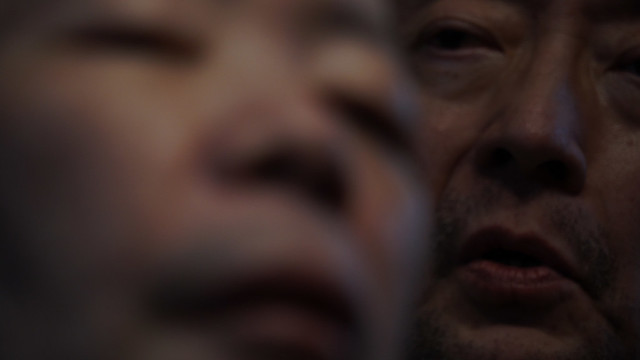Caniba (2017) - Paravel, Castaing-Taylor

Issei Sagawa killed a Dutch woman in Paris and ate part of her body in 1981. It was a case of strong fantasies that twisted one's mind and giving way to violent urges. He was declared insane and sent home. Now in his 60s and partially paralyzed, he is in care of his brother Jun. Véréna Paravel and Lucien Castaing-Taylor, the duo behind a mindboggling, sensory experience that was Leviathan (2012), plunge into face the darkest of human desires and capture only way they can – in extreme close ups. The result is one of the most deeply disturbing love story ever told.
With only long takes, in mostly extreme close up and out-of-focus most of the time of Issei's aging, almost reptilian face, Caniba is a fascinating movie watching experience.
It's usually Jun carrying on a conversation off screen with his semi-comatose brother on the foreground. Issei blurts out almost haiku style answers, often trailing off to yonder. For our (dis)pleasure, Jun flips through a crudely drawn but extremely graphic manga of Issei's deeds (published a long while ago- Issei's been living off of his notoriety) while chastising his brother the whole time, "This is too much for me," "some people like this I suppose," "you weren't eating her while she was alive?" and so on. It goes on forever.
In that crude manga, Issei is always portrayed as little orange creature, the worst caricature of an Orientalized person craving for a fair skinned white woman. After Jun disses the book as 'disgusting shit' and putts it down, Issei says, "C'est fini."
Caniba can be a squirm inducing, endurance piece for people who find the subject matter disturbing. It also contains footage of fetish porn where a girl pisses on a man's face.
Then there is completely innocuous 8mm home movie footage of young Sagawa brothers. They were just like any other home movies, showing happy days when they were children. Then it turns out that Jun is a lifelong masochist and has been inflicting pain on his body with barbed wires, kitchen knives and pins for over 60 years. This part of the movie is perhaps the most difficult to watch.
When he confesses his vice to his brother, it's as if they are in competition - Jun passive aggressively belittles himself and his brother - "You aren't shocked because my fetishes pales in comparison to yours." "I wasn't shocked." Issei replies. Their relationship, just like any other siblings is on a base level, very relatable. Issei, aging and invalid, knows Jun is the only one who truly understands him and loves him even though he is a murderer and a cannibal.
In theory, Caniba is exactly what I look for in filmmaking - technically daring, psychologically complex, and intellectually stimulating, etc. But its subjects' sexual fetishes are too far extreme and disturbing, I can't say I enjoyed the film. Its somewhat happy ending involving cosplay maid in her black and white uniform taking care of Issei was an interesting touch if not a little jarring tonally.
To regard Caniba as just another observational documentary would be a great disservice. Paravel and Castaing-Taylor definitely make an adventurous pair. Their approach and methods in expanding cinematic universe with taking on a challenging subject is more than brave endeavor. The duo peeks into the heart of darkness and it’s truly disturbing. Caniba is a best non-horror horror movie of the year.
No comments:
Post a Comment